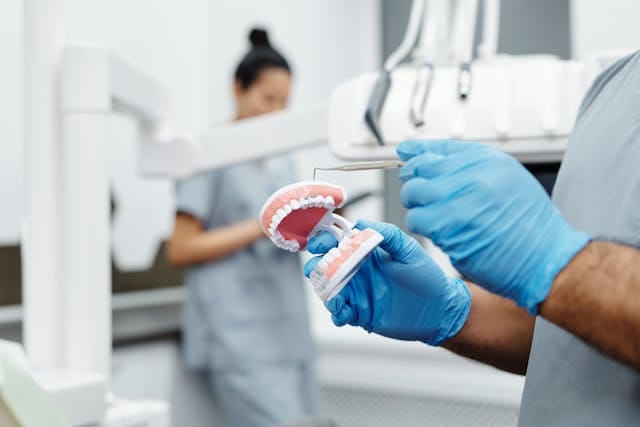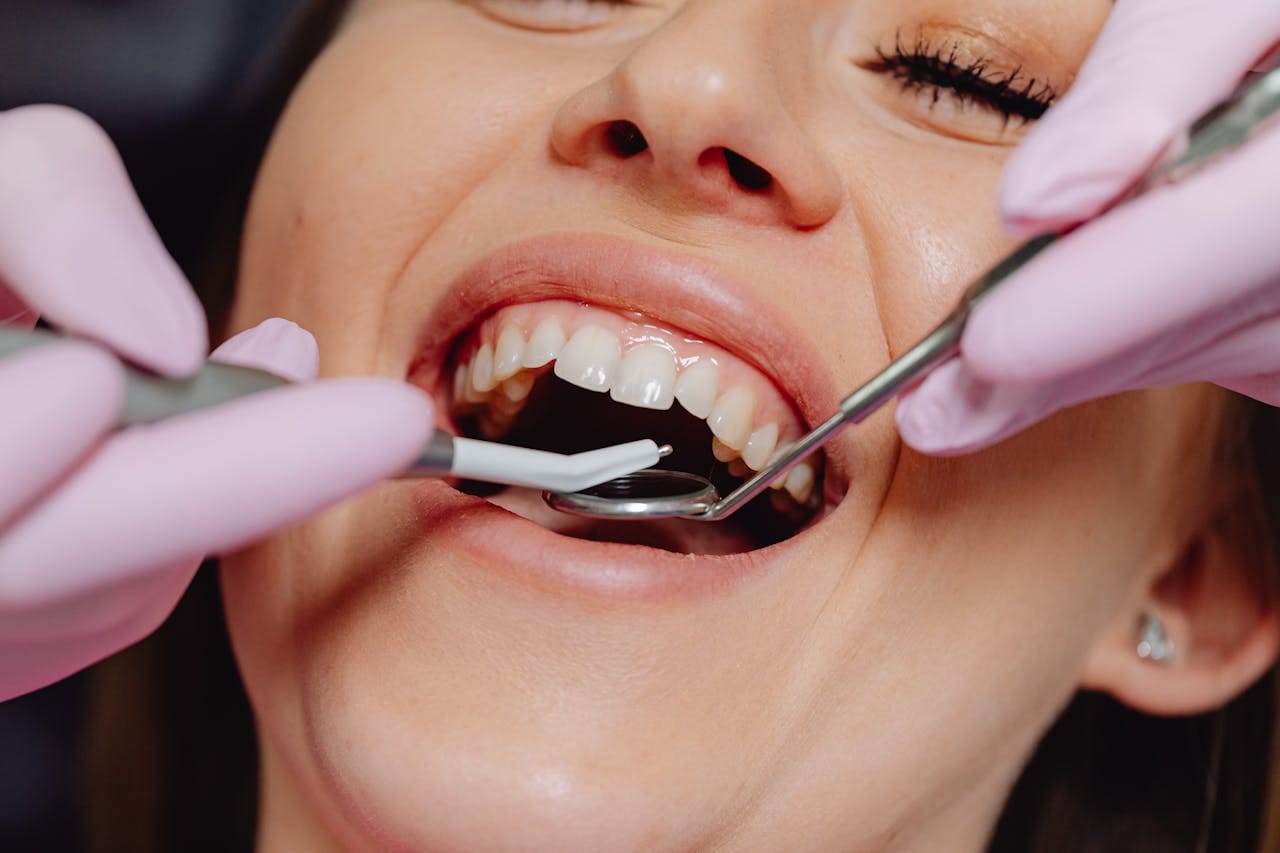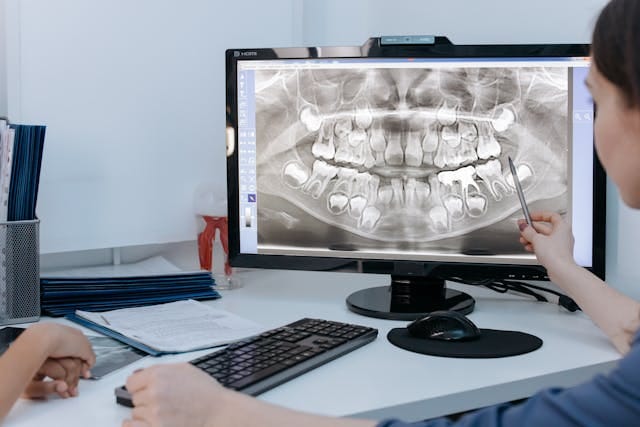Understanding TMJ Disorders and How We Can Help

What is TMJ?
The Role of the Temporomandibular Joint
The temporomandibular joint (TMJ) acts like a hinge, connecting your jawbone to your skull. It’s what lets you talk, chew, yawn, and move your jaw up and down or side to side. Without it, simple actions like eating or speaking would be a challenge.
How TMJ Differs From TMD
Here’s the deal: TMJ refers to the joint itself, while TMD (temporomandibular joint disorder) is the name for conditions that affect this joint. So technically, everyone has a TMJ, but not everyone has TMD.
Causes of TMJ Disorders
Physical Trauma : TMJ Disorders
A blow to the jaw, head, or face can throw off the natural alignment of your TMJ, leading to chronic pain or dysfunction. It might not even take a major accident—sometimes even minor injuries build up over time.
Jaw Misalignment : TMJ Disorders
If your bite is off or your teeth don’t line up correctly, your TMJ can overwork to compensate. Over time, this stress can lead to wear and tear.
Stress and Teeth Grinding (Bruxism) : TMJ Disorders
Stress doesn’t just mess with your head—it messes with your jaw, too. If you clench or grind your teeth at night (maybe without even knowing it), that pressure can cause or worsen TMJ issues.
Arthritis and Other Medical Conditions : TMJ Disorders
Conditions like osteoarthritis or rheumatoid arthritis can inflame and deteriorate the jaw joint, causing discomfort and movement issues.
Common Symptoms of TMJ Disorders
Jaw Pain and Tenderness : TMJ Disorders
This is the most obvious sign. If your jaw feels sore, tight, or painful—especially while eating or talking—it could be TMJ.
Clicking or Popping Sounds : TMJ Disorders
Ever notice a pop or click when you open your mouth? That could signal that your jaw joint isn’t working smoothly.
Limited Jaw Movement : TMJ Disorders
Struggling to open your mouth wide or feeling “locked” in one position? That’s a big red flag for TMJ disorders.
Headaches, Earaches, and Neck Pain : TMJ Disorders
TMJ pain doesn’t always stay in the jaw. It can radiate to your temples, ears, or even down your neck and shoulders.

How TMJ Can Affect Your Daily Life
Eating and Speaking Difficulties
When your jaw isn’t working right, everyday tasks become frustrating. You might avoid certain foods or struggle with conversations.
Sleep Disruptions
Pain and nighttime teeth grinding can rob you of a good night’s sleep, leading to fatigue and irritability.
Mental Health Impacts
Chronic pain takes a toll on your mood and mental well-being. It’s not unusual to feel anxious, depressed, or just plain exhausted from constant discomfort.
Diagnosing TMJ Disorders
Physical Examination
At Fullerton Dental Art, our team begins with a hands-on check of your jaw—feeling for tenderness, listening for clicks, and assessing your range of motion.
Imaging Tests (X-Rays, MRIs, CT Scans)
If needed, we’ll use advanced imaging to get a better look at your joint and surrounding structures. These visuals help us make accurate diagnoses and rule out other issues.
Treatment Options for TMJ Disorders
Home Remedies and Lifestyle Changes
Simple tricks like applying warm compresses, eating soft foods, and avoiding gum can reduce strain on your jaw.
Oral Appliances (Night Guards, Splints)
Custom-fitted appliances can cushion your teeth, prevent grinding, and ease joint pressure—especially while you sleep.
Physical Therapy and Jaw Exercises
Specific stretches and exercises can improve jaw strength and flexibility. Sometimes, your jaw just needs a little “workout” to get back on track.
Medications for Pain and Inflammation
Over-the-counter meds or prescriptions can calm inflammation and ease your discomfort as part of your larger treatment plan.
Dental Treatments and Bite Adjustment
In some cases, adjusting your bite or correcting dental issues (like missing or crooked teeth) can bring the jaw into proper alignment.
Surgical Options (When Necessary)
Surgery is a last resort, but for severe cases that don’t respond to other treatments, we’ll walk you through the safest and most effective procedures.

Why Choose Fullerton Dental Art for TMJ Treatment
Expert Team With Advanced Experience
Our dentists are trained in diagnosing and treating TMJ with precision and care. You’ll never feel like just another patient here.
Personalized Treatment Plans
No cookie-cutter solutions. Every TMJ case is different, and we tailor our approach to suit your specific needs and symptoms.
State-of-the-Art Technology
We use cutting-edge diagnostic tools and treatment equipment to ensure you get the most effective, comfortable care possible.
Convenient Location in Fullerton, CA
Located at 717 N Placentia Ave, Fullerton, CA 92831, our clinic is easy to reach and welcoming to all.
Our TMJ Treatment Process
Initial Consultation and Evaluation
We start with a conversation—getting to know your symptoms, lifestyle, and concerns. Then we perform a thorough exam.
Creating a Tailored Treatment Plan
Once we’ve pinpointed the problem, we’ll design a treatment plan that fits your goals, budget, and schedule.
Ongoing Monitoring and Support
Healing doesn’t happen overnight. We stay with you every step of the way, adjusting your plan as needed to ensure success.
Tips to Prevent TMJ Issues
Avoid Chewing Gum Excessively
Chewing constantly puts a ton of pressure on your TMJ. Ditch the gum and give your jaw a break.
Practice Stress Management
Since stress is a big trigger for teeth grinding, find what helps you relax—whether it’s yoga, music, or just taking a walk.
Maintain Proper Posture
Believe it or not, your posture affects your jaw. Keep your neck and back aligned to avoid unnecessary strain.
When to See a Specialist
If your jaw pain persists beyond a few days, or if it’s interfering with your daily routine, don’t wait it out. The sooner you get help, the faster you’ll feel better.
Visit Fullerton Dental Art at 717 N Placentia Ave, Fullerton, CA 92831. Let us help you find relief from TMJ pain and get your life back on track.
Conclusion
TMJ disorders can quietly creep into your life, affecting everything from chewing to sleeping to smiling. But you’re not stuck with the pain. At Fullerton Dental Art, we understand how this condition impacts your well-being, and we’re here to help. From customized oral appliances to expert care and advanced technology, our Fullerton team is ready to support your journey to comfort and recovery. Your jaw deserves the best—so let’s take care of it, together.
FAQs
What is the difference between TMJ and TMD?
TMJ is the name of the joint, while TMD (temporomandibular disorder) refers to issues affecting that joint.
Can TMJ go away on its own?
Mild cases can improve with self-care, but persistent or severe symptoms usually require professional treatment.
Are TMJ disorders common?
Yes, millions of Americans experience TMJ issues—especially those dealing with stress or bite problems.
Is surgery always required for TMJ?
Nope! Most cases are treated successfully with non-surgical options like night guards, therapy, or medication.
How can Fullerton Dental Art help with my TMJ issues?
We offer personalized, tech-driven solutions that get to the root of your discomfort and bring lasting relief.
Fullerton Dental Art Contact Details
Location: 717 N PLACENTIA AVE FULLERTON, CA 92831
Phone: +1-714-577-0105
Book An Appointment Now in Fullerton, CA
Latest Post
101 Pediatric Dentistry: Creating Positive Dental Experiences

Introduction To Pediatric Dentistry Pediatric dentistry is about more than just treating tiny teeth; it’s about nurturing a lifetime of healthy smiles. Ensuring that…
Achieve A Better Dental Health with Fullerton Dental Art

Introduction Dental health is crucial not just for a brighter smile, but for overall well-being. At Fullerton Dental Art, we are dedicated to providing…
Best 3 Types of Dental Cleaning in Fullerton, CA

Introduction to Types of Dental Cleaning Keeping your teeth clean isn’t just about looking good—it’s essential for overall health. Let us discuss the types…
Best 5 Tips for Maintaining Healthy Teeth and Gums

Maintaining healthy teeth and gums is essential for a bright smile and well-being. Proper oral care not only boosts your confidence but also prevents…
Best Dental Tips for Parents and Kids

Getting ready for a new school year involves more than just shopping for supplies and organizing schedules. Oral health plays a crucial role in…
Best Digital Dentistry For Fullerton

Introduction Digital Dentistry Technology is transforming the dental industry at an unprecedented pace, making treatments more efficient, accurate, and comfortable for patients. Fullerton Dental…
Best Family Dentist in Fullerton: For All Ages

Introduction Finding the right family dentist doesn’t have to feel like searching for a needle in a haystack. At Fullerton Dental Art, located at…
Best Food That Helps to Improve Dental Health

Introduction Taking care of your teeth isn’t just about having a sparkling smile; it’s a crucial part of overall health. Poor dental health can…








